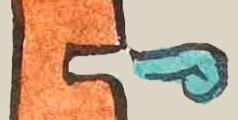nahuatl (Mdz23r)
This element has been carved from the compound sign for the place name, Cuauhnahuac. The visual captures what scholars call a speech scroll. This one rolls horizontally to the right, with the curling part down. It is painted turquoise. We have retained part of the original tree and the mouth, to show how the scroll typically emerges from a mouth.
Stephanie Wood
The speech scroll is a visual meant to evoke -nahuac, a locative, which sounds like nahuatl but means "near" or "next to." Its coloring (turquoise blue) may suggest a reverence for the spoken word. In Nahua culture, the ruler was the tlahtoani, the one who speaks. See below right, for other examples of the speech scroll, which can present itself to the left or to the right, usually curling under. One presentation of nahuatl has many curls and a yellow color, and this one awaits fuller analysis. Also below, right, the viewer may see some examples of how nahuatl could be used to represent the locative -nahuac.
Stephanie Wood
c. 1541, but by 1553 at the latest
Stephanie Wood

nahua(tl), speech, language, https://nahuatl.wired-humanities.org/content/nahuatl
nahua, to speak, https://nahuatl.wired-humanities.org/content/nahua
-nahuac, near, next to, https://nahuatl.wired-humanities.org/content/nahuac
pleasant sound
hablar
Stephanie Wood
Codex Mendoza, folio 23 recto, https://digital.bodleian.ox.ac.uk/objects/2fea788e-2aa2-4f08-b6d9-648c00..., image 56 of 188.
The Bodleian Libraries, University of Oxford, hold the original manuscript, the MS. Arch. Selden. A. 1. This image is published here under the UK Creative Commons, “Attribution-NonCommercial-ShareAlike 3.0 License” (CC-BY-NC-SA 3.0).




